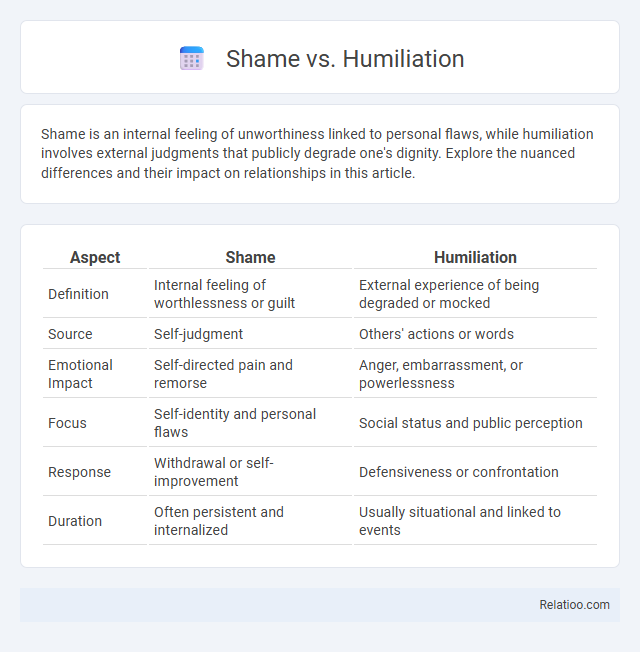Shame is an internal feeling of unworthiness linked to personal flaws, while humiliation involves external judgments that publicly degrade one's dignity. Explore the nuanced differences and their impact on relationships in this article.
Table of Comparison
| Aspect | Shame | Humiliation |
|---|---|---|
| Definition | Internal feeling of worthlessness or guilt | External experience of being degraded or mocked |
| Source | Self-judgment | Others' actions or words |
| Emotional Impact | Self-directed pain and remorse | Anger, embarrassment, or powerlessness |
| Focus | Self-identity and personal flaws | Social status and public perception |
| Response | Withdrawal or self-improvement | Defensiveness or confrontation |
| Duration | Often persistent and internalized | Usually situational and linked to events |
Understanding Shame: A Deep-Rooted Emotion
Shame is a deep-rooted emotion linked to a negative self-assessment that affects personal identity, while humiliation involves an external act that degrades a person publicly. Understanding shame requires recognizing its internal origin, often triggered by perceived moral failures or social rejection, distinguishing it from humiliation's focus on external judgment. Addressing shame effectively involves fostering self-compassion and rebuilding a positive self-concept to counteract its pervasive impact on mental health.
Defining Humiliation: External Triggers and Responses
Humiliation is characterized by external triggers such as public embarrassment, social rejection, or unfair treatment that provoke a deep sense of powerlessness and loss of dignity. Unlike shame, which is an internal feeling stemming from personal shortcomings or perceived failures, humiliation arises from others' actions or judgments that expose vulnerability. Your response to humiliation often includes feelings of anger, helplessness, or a desire to restore social status, highlighting the significant impact of external social dynamics on this emotional experience.
Key Differences Between Shame and Humiliation
Shame is an internal feeling of worthlessness or inadequacy, often arising from personal failure or moral shortcomings, while humiliation is an external experience caused by others' deliberate actions that degrade or embarrass someone publicly. Shame tends to be private and self-imposed, whereas humiliation involves social contexts where the individual's dignity is attacked openly. The key difference lies in shame being self-focused and internal, and humiliation being externally inflicted and socially directed.
Psychological Impact of Shame
Shame triggers intense feelings of personal inadequacy and self-condemnation, profoundly affecting mental health by fostering low self-esteem and social withdrawal. Psychological impact of shame often leads to anxiety, depression, and impaired interpersonal relationships due to internalized negative self-perception. Unlike humiliation, which stems from external judgments, shame originates within, causing deep emotional pain and a disruptive influence on one's identity and behavior.
The Lasting Effects of Humiliation
Humiliation causes deeper psychological scars than shame, often leading to long-term damage in self-esteem and social functioning. While shame is an internal feeling linked to personal shortcomings, humiliation results from external actions that degrade an individual publicly, intensifying emotional trauma. The lasting effects of humiliation can include chronic anxiety, depression, and impaired interpersonal relationships, highlighting its profound impact on mental health.
Triggers and Causes: Shame vs. Humiliation
Shame arises internally from a perceived failure to meet personal or societal standards, often triggered by self-reflection on moral or identity breaches, while humiliation results from external actions that expose an individual to ridicule or degradation by others. Triggers for shame typically include personal mistakes or social transgressions, whereas humiliation is caused by others' intentional or accidental behaviors that publicly demean or belittle. Understanding these distinctions highlights how shame is connected to self-evaluation and internal emotions, and humiliation stems from social dynamics and external judgment.
Social Contexts: How Society Influences Both
Shame arises internally when individuals perceive themselves as failing to meet personal or societal standards, while humiliation is externally imposed through actions or judgments by others that degrade one's worth. Social contexts amplify shame by embedding cultural norms and expectations that dictate acceptable behavior, causing individuals to internalize societal disapproval. Humiliation often results from public exposure or social penalties, reinforcing power dynamics and socially constructed hierarchies that influence collective perceptions of identity and dignity.
Coping Strategies and Recovery for Each
Shame involves a painful focus on self as flawed, while humiliation centers on feeling devalued by others, and guilt relates to specific behaviors. Effective coping strategies for shame include developing self-compassion and seeking therapy to reframe negative self-beliefs. For humiliation, assertive communication and social support help restore dignity; guilt is best addressed by making amends and learning from mistakes to promote personal growth and recovery.
The Role of Empathy in Addressing These Emotions
Empathy plays a crucial role in differentiating and addressing shame, humiliation, and guilt by fostering understanding and emotional support. You can alleviate shame by recognizing its internal self-judgment nature, while humiliation involves external factors that damage personal dignity, necessitating compassionate responses to restore self-worth. Applying empathy helps repair emotional wounds, promoting healing and resilience in those experiencing these complex emotions.
Transforming Shame and Humiliation into Growth
Shame and humiliation both trigger deep emotional pain, yet shame stems from internal self-judgment while humiliation arises from external social experiences. Transforming shame and humiliation into growth involves recognizing these feelings as signals for self-reflection and resilience building. Embracing vulnerability and practicing self-compassion are key strategies for converting destructive emotions into opportunities for personal development and emotional strength.

Infographic: Shame vs Humiliation
 relatioo.com
relatioo.com